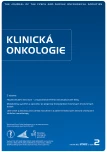An impending rupture of the subclavian artery after chemoradiotherapy
Authors:
S. Hattori 1; Y. Kodama 1; H. Satoh 2
Authors‘ workplace:
Division of General Medicine, University of Tsukuba, Mito Medical Center, Ibaraki, Japan
1; Division of Respiratory Medicine, University of Tsukuba, Mito Medical Center, Ibaraki, Japan
2
Published in:
Klin Onkol 2022; 35(2): 156
Category:
Short Communication
doi:
https://doi.org/10.48095/ccko2022156
A 57-year-old man with a 20 pack-year smoking history was referred to our hospital complaining of left upper chest pain. The patient had no vascular malformations and no congenital anomalies leading to vascular disorders. He had no comorbid collagen disease that causes vasculitis. He had received left lower lobectomy 3 years ago due to adenocarcinoma of the lung. Two years ago, he received chemoradiotherapy for a recurrence of the left upper mediastinal lymph node. After that, he was receiving maintenance therapy with pemetrexed. At this time, physical examination was unremarkable. The Treponema pallidum hemagglutination test was negative. Contrast-enhanced CT showed an aneurysm of the left subclavian artery and bleeding into the tumor (Fig. 1). He was taken to another emergency hospital and underwent surgical treatment. This treatment prevented rupture of the subclavian artery, but the patient had cerebral infarction and died 3 weeks after the onset of this complication. Autopsy was not permitted.

Aneurysm of the subclavian artery occurs rarely [1–4], and the rupture of the subclavian artery aneurysm is extremely rare [3,4]. Aneurysms are known to develop as a disease of the arteries themselves, but can occur as a result of lung cancer invading the arteries. It can also occur with effective chemotherapy or radiation therapy for lung cancer that has invaded the arteries, although the precise mechanism of the development of the aneurysm is not clear. Our patient complained of pain in the left anterior chest, which is presumed to have been associated with impending rupture. The pain was not necessarily severe, and knock pain was not observed. Very rarely, chest pain that appears in patients with vascular invasion treated with chemoradiotherapy may suggest the possibility of an impending rupture of the blood vessel in the differential diagnosis. The urgency should be evaluated together with the CT image.
The authors declare they have no potential conflicts of interest concerning drugs, products, or services used in the study.
Autoři deklarují, že v souvislosti s předmětem studie nemají žádné komerční zájmy.
The Editorial Board declares that the manuscript met the ICMJE recommendation for biomedical papers.
Redakční rada potvrzuje, že rukopis práce splnil ICMJE kritéria pro publikace zasílané do biomedicínských časopisů.
Hiroaki Satoh, MD, PhD
Division of Respiratory Medicine,
Mito Medical Center
University of Tsukuba
Miya-machi 3-2-7
Mito-city, Ibaraki, 310-0015
Japan
e-mail: hirosato@md.tsukuba.ac.jp
Submitted/Obdrženo: 12. 9. 2021
Accepted/Přijato: 21. 12. 2021
Sources
1. Hong CW, Liao WI, Tsai SH et al. Middle-aged man with neck swelling. Ann Emerg Med 2020; 76 (1): e3-e4. doi: 10.1016/j.annemergmed.2020.01.011.
2. Broder J, Steele B, Kheang S. Elderly woman with pain and numbness in left hand. Ann Emerg Med 2016; 67 (4): e13–e14. doi: 10.1016/j.annemergmed.2015.10. 005.
3. Siegel AU, Castro A, Sechrist J. Subclavian artery aneurysmal rupture and left internal mammary artery extravasation secondary to advanced Marfan syndrome. Am J Emerg Med 2021; 45 : 684.e1–684.e3. doi: 10.1016/j.ajem.2020.12.045.
4. Miyamoto K, Nakamura M, Suzuki K et al. Diagnosis of neurofibromatosis type 1 after rupture of aneurysm and consequent fatal hemothorax. Am J Emerg Med 2020; 38 (7): 1543.e3–1543.e5. doi: 10.1016/j.ajem.2020.04. 004.
Labels
Paediatric clinical oncology Surgery Clinical oncologyArticle was published in
Clinical Oncology

2022 Issue 2
- Possibilities of Using Metamizole in the Treatment of Acute Primary Headaches
- Metamizole at a Glance and in Practice – Effective Non-Opioid Analgesic for All Ages
- Metamizole vs. Tramadol in Postoperative Analgesia
- Spasmolytic Effect of Metamizole
- Metamizole in perioperative treatment in children under 14 years – results of a questionnaire survey from practice
-
All articles in this issue
- Předsednictví Francie a České republiky v Radě Evropské unie – informace k významným akcím v oblasti onkologie
- Acupuncture from the perspective of evidence-based medicine – options of clinical use based on National Comprehensive Cancer Network (NCCN) guidelines
- Hepatocellular carcinoma – prognostic criteria of individualized treatment
- Rehabilitation and physical activity in gynecological oncological diseases
- Radiotherapy and radiosensitivity syndromes in DNA repair gene mutations
- Coherence controlled holographic microscopy – a tool for detection of new biomarkers of head and neck squamous cell carcinoma
- Metabolic syndrome in long-term survivors after allogeneic hematopoietic stem cell transplantation
- Chemoradiotherapy in the treatment of cervical cancer – a single institution retrospective review
- Aktuality z odborného tisku
- Informace z České onkologické společnosti
- Late-onset pulmonary and cardiac toxicities in a patient treated with immune checkpoint inhibitor monotherapy
- An impending rupture of the subclavian artery after chemoradiotherapy
- Clinical Oncology
- Journal archive
- Current issue
- About the journal
Most read in this issue
- Acupuncture from the perspective of evidence-based medicine – options of clinical use based on National Comprehensive Cancer Network (NCCN) guidelines
- Radiotherapy and radiosensitivity syndromes in DNA repair gene mutations
- Hepatocellular carcinoma – prognostic criteria of individualized treatment
- Rehabilitation and physical activity in gynecological oncological diseases
